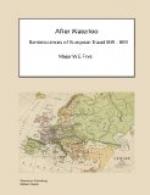Culte pianure e delicati colli,
Chiare acque, ombrose ripe e prati molli.[47]
’Mid cultivated plain, delicious
hill,
Moist meadow, shady bank, and crystal
rill.
—Trans. W.S. ROSE.
The city of Dijon is large, handsome and well built. It has an appearance of industry, comfort and airiness. There are several mustard manufactories in this town. A dinner was given yesterday by the municipality to the National Guard, and an immense quantity of mustard was devoured on the occasion in honor of the staple manufactory of Dijon. From Dijon I put myself in the diligence to go to Chalon and after stopping two hours at Beaune, arrived at Chalon at 5 o’clock p.m. The country between Dijon and Chalon is flat, but cultivated like a garden. It is likewise the wine country par excellence. I do not know a wine more agreeable to palate than the wine of Beaune.
At Chalon I put up at the Hotel du Parc. Chalon is beautifully situated on the banks of the Saone. The Quai is well constructed and forms an agreeable promenade. There is an Austrian garrison in Chalon. The hostess of the inn told me that Napoleon stopped at her house on his way from Lyons to Paris, when he returned from Elba, and she related to me with great eagerness many anecdotes of that extraordinary man: she said that such was the empressement on the part of the inhabitants to see him, and embrace him by way of testifying their affection, that the Emperor was obliged to say: “Mais vous m’etouffez, mes enfans!” In fact, had the army remained neutral, the peasantry




